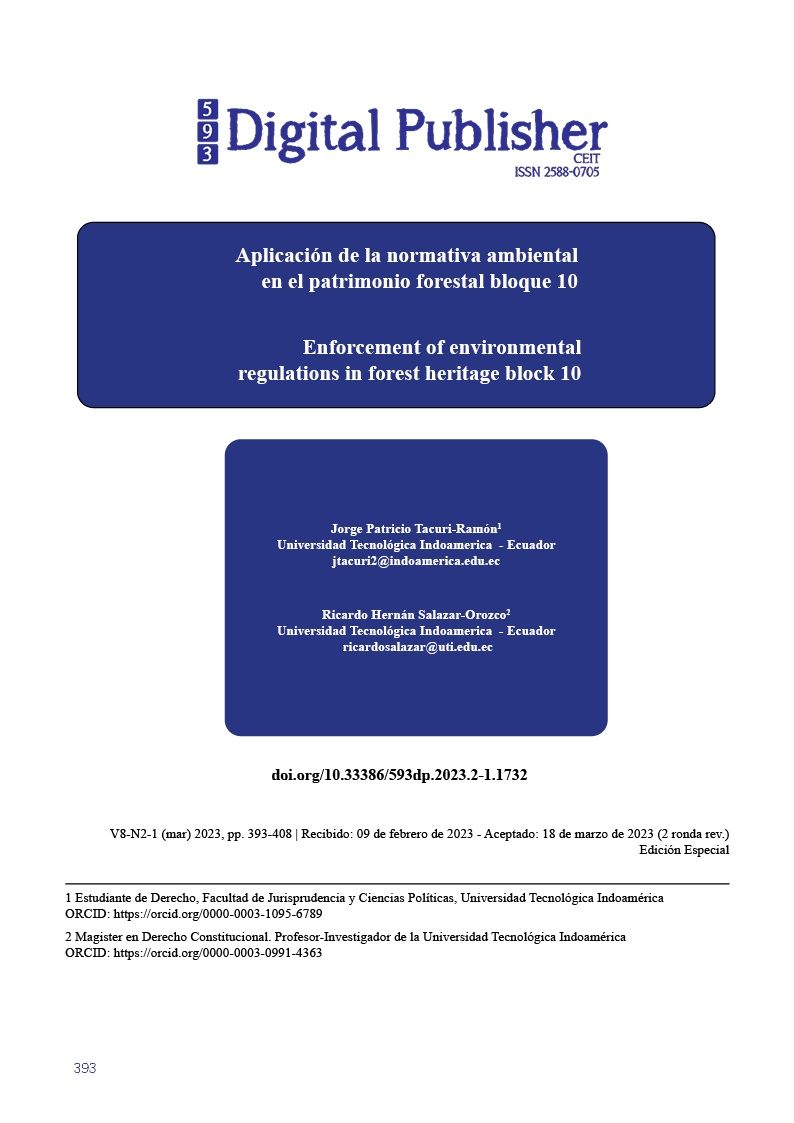Enforcement of environmental regulations in forest heritage block 10
Main Article Content
Abstract
The subject of environmental law has been little dealt with and has received little attention from authorities, professionals and society in general, without having come to understand that its application is of great importance in our times. The phenomenon of globalization has brought a great number of benefits, but it has also introduced in our way of thinking, criteria one hundred percent consumerist; but we do not think about the consequences that our actions will bring, nor in what we will leave for the generations that will succeed us. The Ecuadorian environmental legislation, although not very specific in relation to the moorlands, is there and should be put into practice to make it respected and thus protect this ecosystem, our access to its beauty, its splendor, its gift, which is water, life. The main objective of this article is to analyze the application of environmental regulations in the forest heritage block 10. As a result, it was found that the application of environmental regulations is fundamental in Ecuador to protect the environment and guarantee sustainable development. Environmental degradation and biodiversity loss are global problems and require action by all countries, including Ecuador.
Downloads
Article Details

This work is licensed under a Creative Commons Attribution-NonCommercial-ShareAlike 4.0 International License.
1. Derechos de autor
Las obras que se publican en 593 Digital Publisher CEIT están sujetas a los siguientes términos:
1.1. 593 Digital Publisher CEIT, conserva los derechos patrimoniales (copyright) de las obras publicadas, favorece y permite la reutilización de las mismas bajo la licencia Licencia Creative Commons 4.0 de Reconocimiento-NoComercial-CompartirIgual 4.0, por lo cual se pueden copiar, usar, difundir, transmitir y exponer públicamente, siempre que:
1.1.a. Se cite la autoría y fuente original de su publicación (revista, editorial, URL).
1.1.b. No se usen para fines comerciales u onerosos.
1.1.c. Se mencione la existencia y especificaciones de esta licencia de uso.
References
Asamblea Constituyente. (2008). Constitución de la República del Ecuador. https://app.vlex.com/#search/jurisdiction:EC/constitucion+de+la+republica+del+ecuador/WW/vid/631446215/expression/661485285
Asamblea Nacional. (2014). Código Orgánico Integral Penal. https://app.vlex.com/#search/jurisdiction:EC,EA/coip/WW/vid/631464447
Asamblea Nacional. (2016). Ley Orgánica de tierras rurales y territorios ancestrales. Registro Oficial No 711. https://app.vlex.com/#search/jurisdiction:EC,EA/ley+organica+de+tierra/WW/vid/643461197
Asamblea Nacional. (2017). Codigo Orgánico Del Ambiente. https://app.vlex.com/#search/jurisdiction:EC,EA/codigo+organico+del+ambiente/WW/vid/879613056/expression/677249125
Bedón Garzón, R. (2016). Contenido y aplicación de los derechos de la naturaleza. Ius Humani. Law Journal, 5, 133-148. https://doi.org/10.31207/ih.v5i0.124
Bustos, A., Coronel, J., & Onofa, A. (2019). Los incendios forestales en Ecuador. Osbodigital. Todo sobre gestión forestal. https://osbodigital.es/2019/03/25/los-incendios-forestales-en-ecuador/
Cámara Nacional De Representantes - El Plenario De Las Comisiones Legislativas. (1981). Ley Forestal y de conservación de áreas naturales y vida silvestre. En Num. 64.-REGISTRO OFICIAL.-Agosto 24.-1981 No. 74.
Criollo Chavez, A. L. (2017). “NECESIDAD DE ESTABLECER NUEVAS MEDIDAS DE SANCIONES DE PRISION, EN RELACION AL TRAFICO DE LAS ESPECIES EXÓTICAS Y SILVESTRES DE CONFORMIDAD CON LO QUE ESTABLECE EL ARTICULO 247, DEL CÓDIGO ORGÁNICO INTEGRAL PENAL DEL ECUADOR” [Tesis de Grado, UNIVERSIDAD NACIONAL DE LOJA]. https://dspace.unl.edu.ec/jspui/handle/123456789/19012
Direccion Nacional Forestal. (2016). INFORME DE PROCESOS Y ESTADO DE LA SITUACIÓN DE LA TENENCIA DE TIERRAS DE LOS BLOQUES 10 Y 11 (MAE-DNF-2016-UNF-MC-PH-069). Ministerio del Ambiente.
Dos millones de hectáreas de bosque se han talado ilegalmente en el país. (2021, octubre 4). Primicias. https://www.primicias.ec/noticias/sociedad/dos-millones-bosque-tala-ecuador/
Martínez Moscoso, A. (2019). El nuevo marco jurídico en materia ambiental en Ecuador: Estudio sobre el Código Orgánico del Ambiente. Actualidad Jurídica Ambiental, 89 (Abril), 14-46.
Ministerio del Ambiente. (2007). Norma Para El Procedimiento Para La Adjudicación De Tierras Del Patrimonio Forestal Del Estado Y Bosques Y Vegetación Protectores. Acuerdo Ministerial 265. https://www.gob.ec/sites/default/files/regulations/2018-09/265%20Adjudicacion%20de%20Tierras%20reducido.pdf
Ministerio del Ambiente Agua y Transición Ecológica. (2017). Prevención y control de incendios una prioridad nacional. https://www.ambiente.gob.ec/prevencion-y-control-de-incendios-una-prioridad-nacional/
Ministerio del Ambiente, Agua y Transición Ecológica. (2022). Acuerdo Ministerial Nro. MAATE-2022-110. https://app.vlex.com/#search/jurisdiction:EC,EA/reglamento+al+codigo+organico+de+ambiente/p2/WW/vid/915056695
Montaño, D. (2021, marzo 18). Nuevo estudio: En los últimos 26 años Ecuador ha perdido más de 2 millones de hectáreas de bosque. Noticias ambientales. https://es.mongabay.com/2021/03/nuevo-estudio-en-los-ultimos-26-anos-ecuador-ha-perdido-mas-de-2-millones-de-hectareas-de-bosque/
Morales, M., Habela, M. del C., Hernández, P., & Andrade, M. B. (2015). Delitos contra el Medio Ambiente y la Naturaleza o Paccha Mama en la Legislación Penal Ecuatoriana. ECOLEX-MANUAL PARA LA INVESTIGACIÓN DE DELITOS CONTRA EL AMBIENTE Y LA NATURALEZA O PACHA MAMA: BOSQUES Y SUELO, 102.
Narváez Alvarez, M. J., & Escudero Soliz, J. M. (2021). Los derechos de la Naturaleza en los tribunales ecuatorianos. Iuris Dictio, 15. https://doi.org/10.18272/iu.v27i27.2121
Primeros sentenciados por delito de invasión al Refugio de Vida Silvestre La Chiquita en Esmeraldas – Ministerio del Ambiente, Agua y Transición Ecológica. (2014, diciembre 3). https://www.ambiente.gob.ec/primeros-sentenciados-por-delito-de-invasion-al-refugio-de-vida-silvestre-la-chiquita-en-esmeraldas/
Acuerdo ministerial 202, Pub. L. No. AM 202 (1998).
Zambrano, G. C., Mejía, S. A., & Tamariz, G. (2014). FISCALÍA GENERAL DEL ESTADO - ECUADOR.
Cuenca, J., Gallardo, K., & Domínguez, I. (2021). Gestores ambientales en Ecuador: Enfoque a la biorremediación. Green World Journal, 4(02), 2.
Espinosa, V. I. (2014). El daño ambiental y la responsabilidad del Estado de acuerdo a la Constitución de la República del Ecuador del año 2008.
García, D. J., & Moreno, W. S. (2017). Relación entre crecimiento económico y medio ambiente en Ecuador a nivel provincial (Promedio 2010-2015). Revista Amazónica Ciencia y Tecnología, 6(2), 99-112.
Garzón, R. B. (2010). Aspectos procesales relativos al daño ambiental en el Ecuador. Ius Humani. Law Journal, 2, 9-41.
González, A. (2019). Gestión ambiental y competitividad de las PYMES del sector comercio en el cantón Machala, Provincia El Oro, Ecuador. Gestión, 40(27).
Jaramillo, D. C. (2020). Delimitación de las competencias para la determinación de la existencia de daño ambiental en el Ecuador [B.S. thesis]. PUCE-Quito.
Moscoso, A. M. (2019). El nuevo marco jurídico en materia ambiental en Ecuador. Estudio sobre el Código Orgánico del Ambiente. Actualidad Jurídica Ambiental, 89, 3-32.
Pacheco, G. D. (2021). Pobreza y daño ambiental en Ecuador año 2018 [B.S. thesis].
Pentinat, S. B. (2020). Los derechos de la Naturaleza en Europa: Hacia nuevos planteamientos transformadores de la protección ambiental. Revista de Derecho Comunitario Europeo, 24(65), 79-120.
Peralta, S. L., & Montero, A. C. (2019). Estimación del costo de reparación del daño ambiental en el suelo de cacao en la provincia de Cotopaxi-Ecuador. Revista Científica Ecociencia, 6(1), 1-16.
Quintana, J. X., Rodríguez, M. Z., & Montenegro, J. M. (2020). La dimensión ambiental en la carrera de derecho de la Uniandes, Ecuador: Transversalización en la formación de la cultura jurídica ambiental. Amauta, 18(35), 167-186.
Tamayo, F. M., Pascumal, R. F., & Maisanche, D. A. (2021). El principio de sustentabilidad en el Ecuador. Revista Científica FIPCAEC (Fomento de la investigación y publicación científico-técnica multidisciplinaria). ISSN: 2588-090X. Polo de Capacitación, Investigación y Publicación (POCAIP), 6(3), 181-198.



